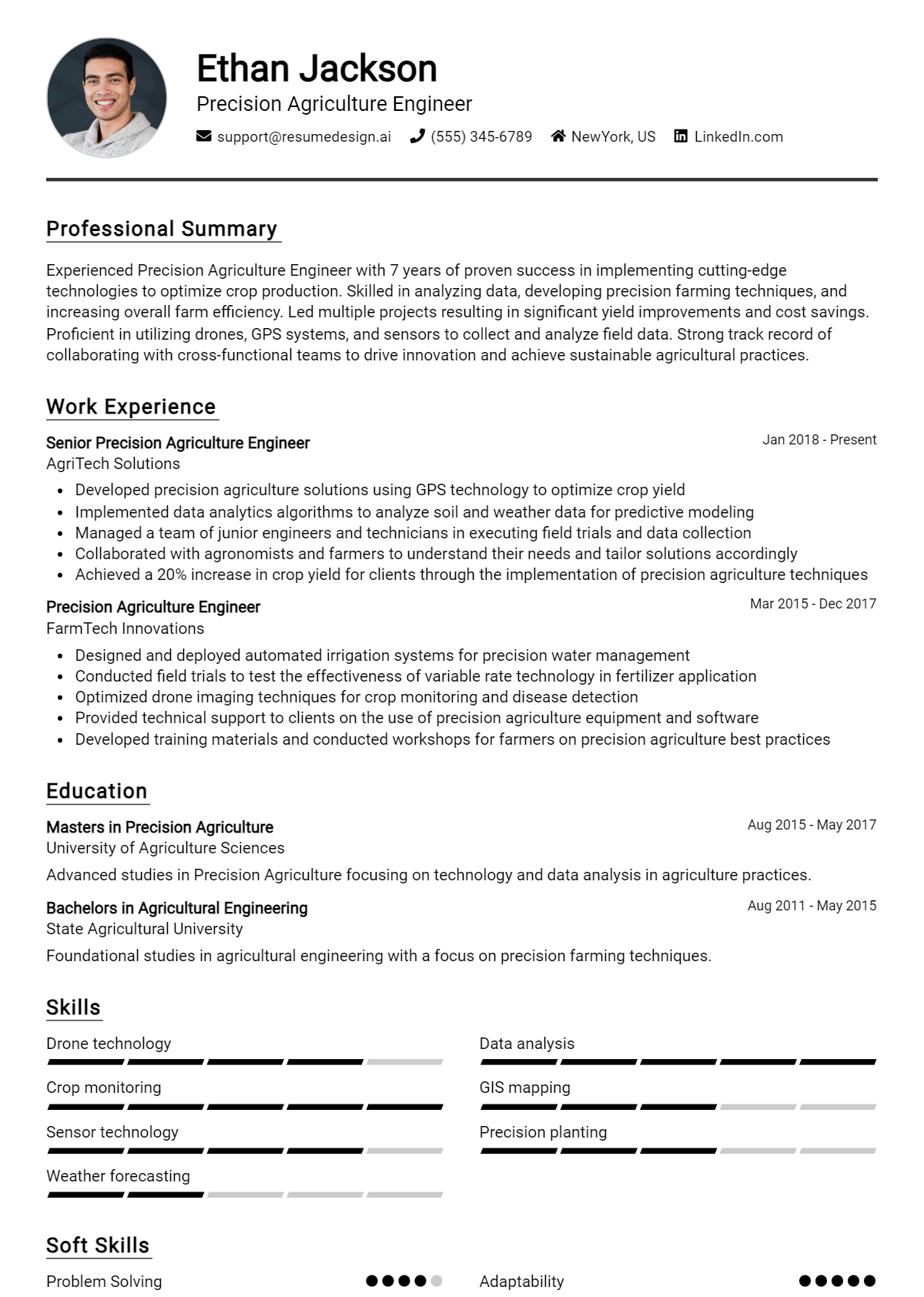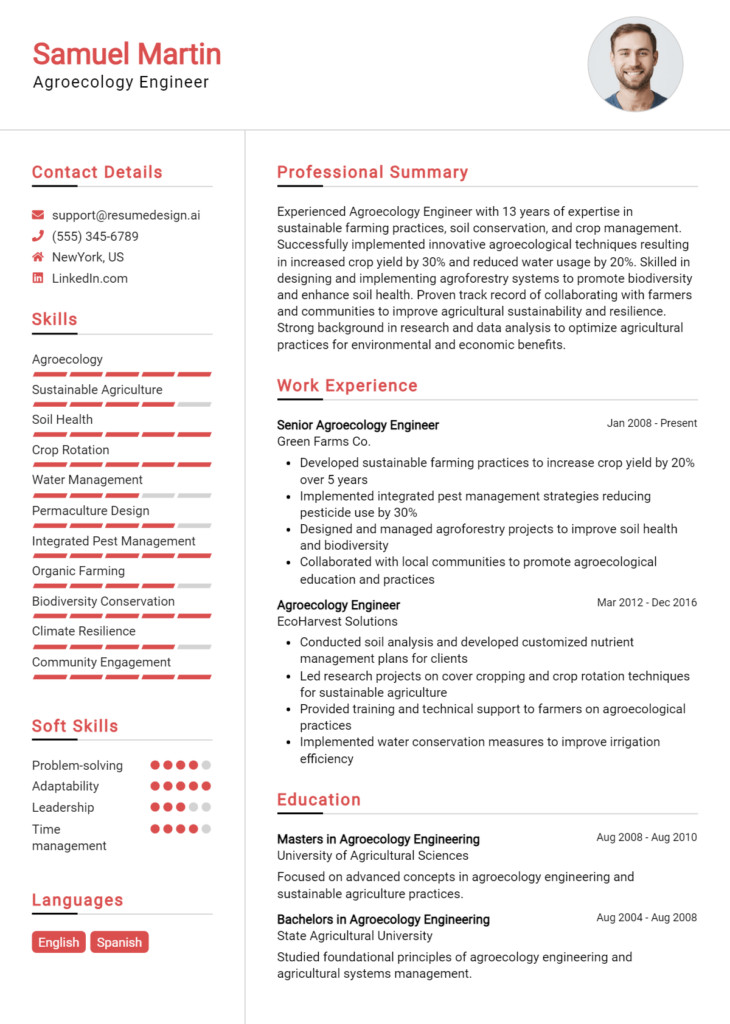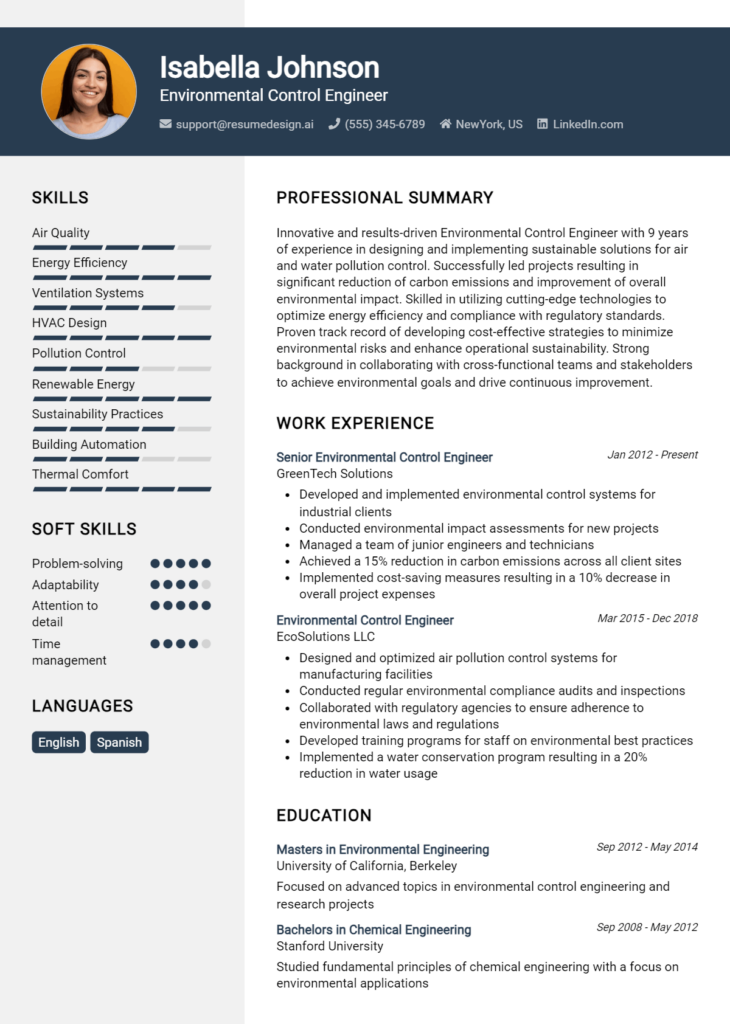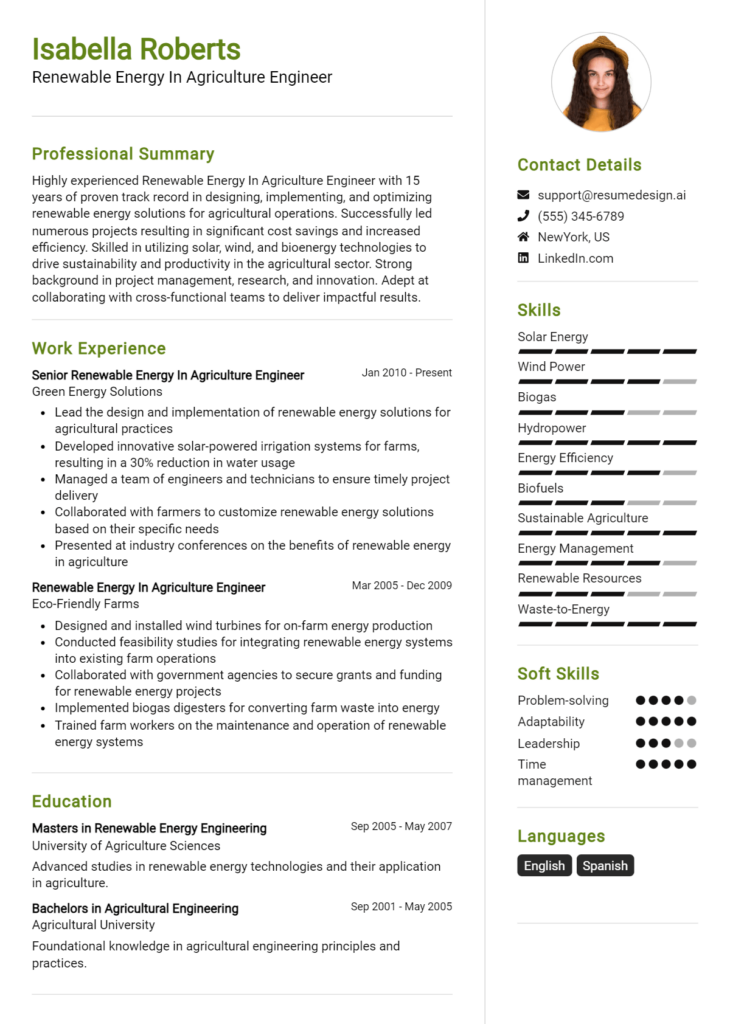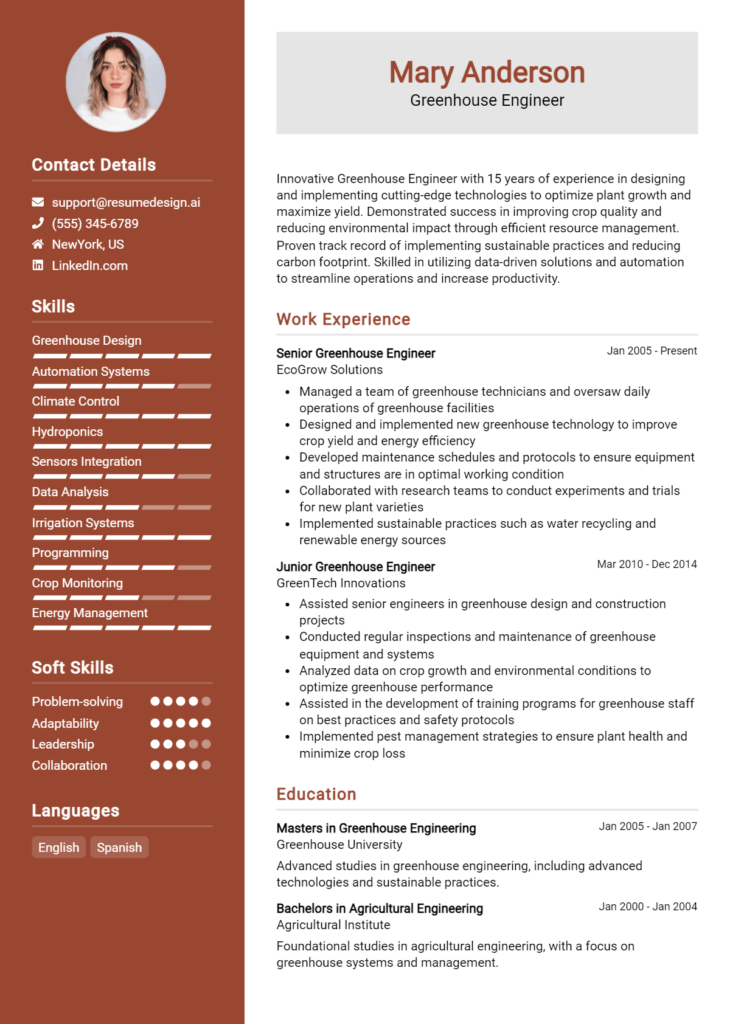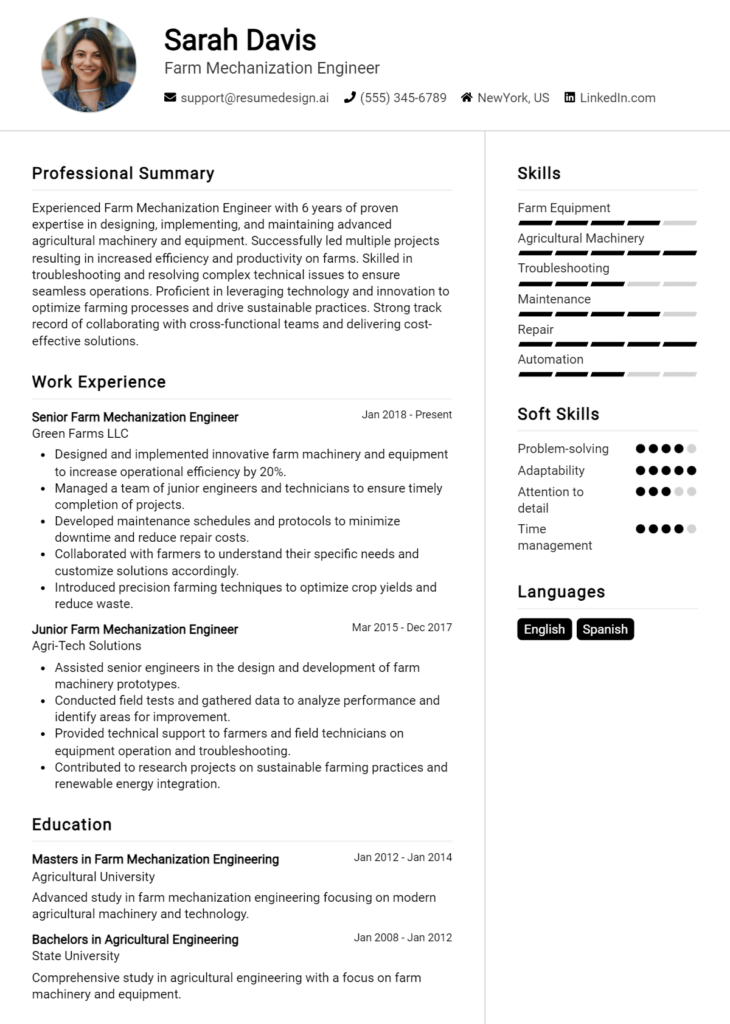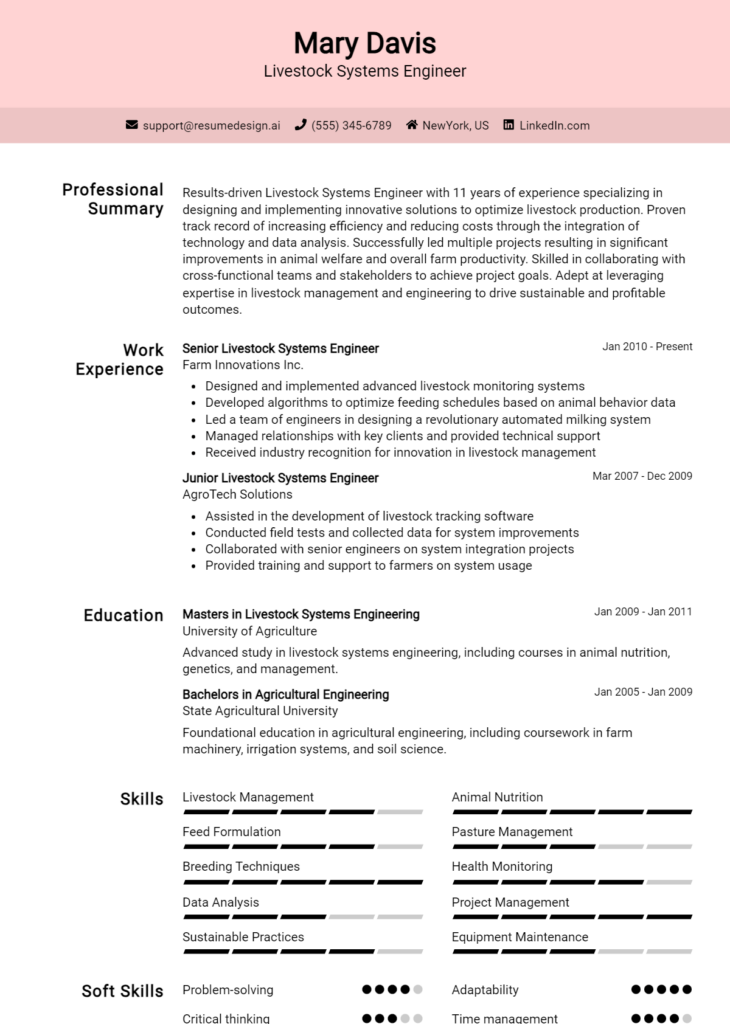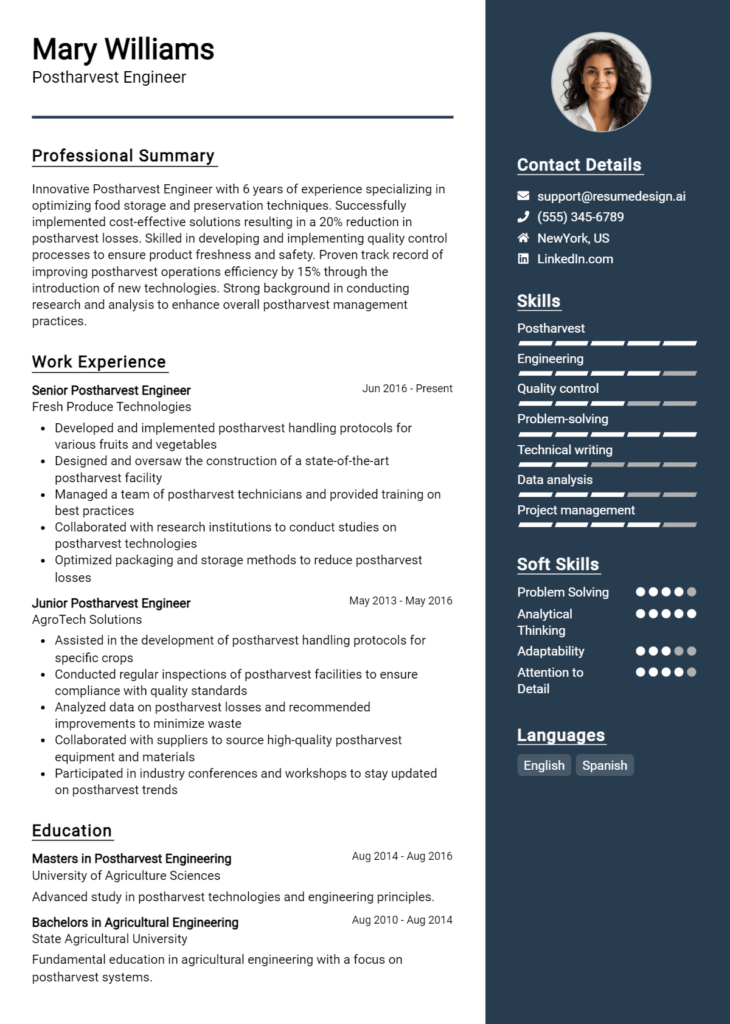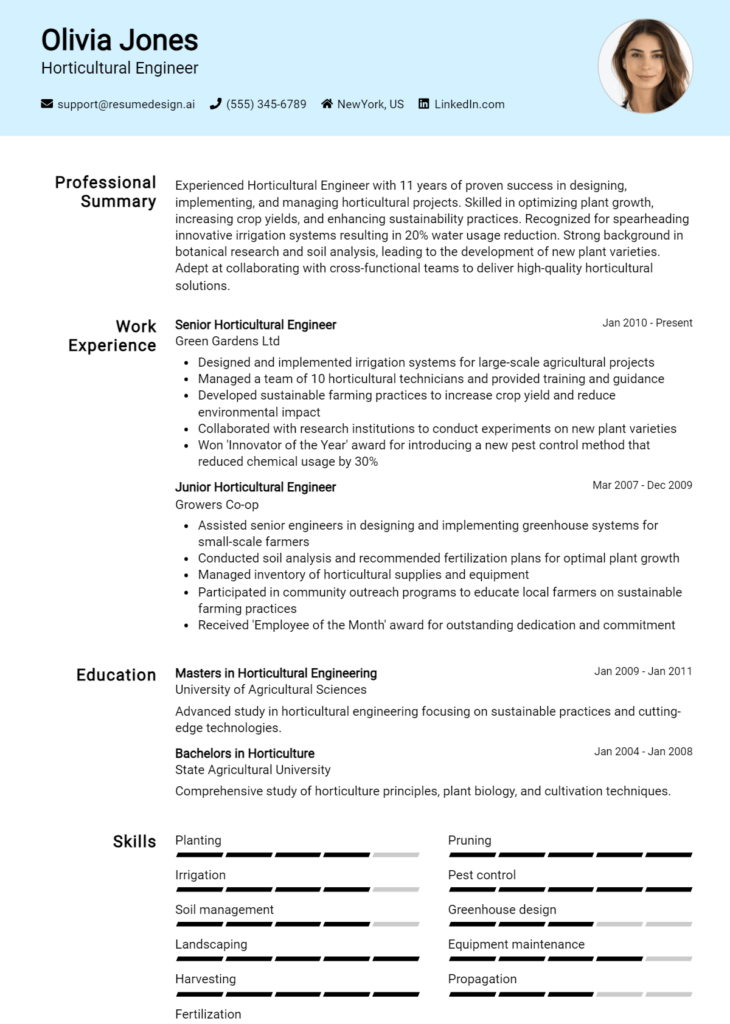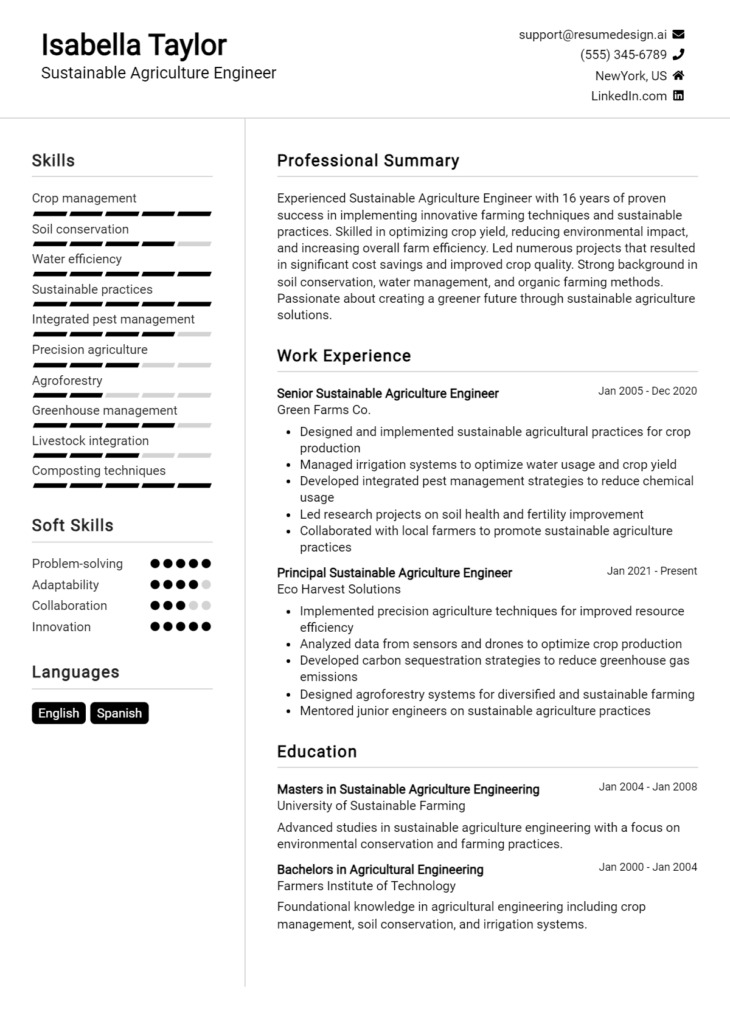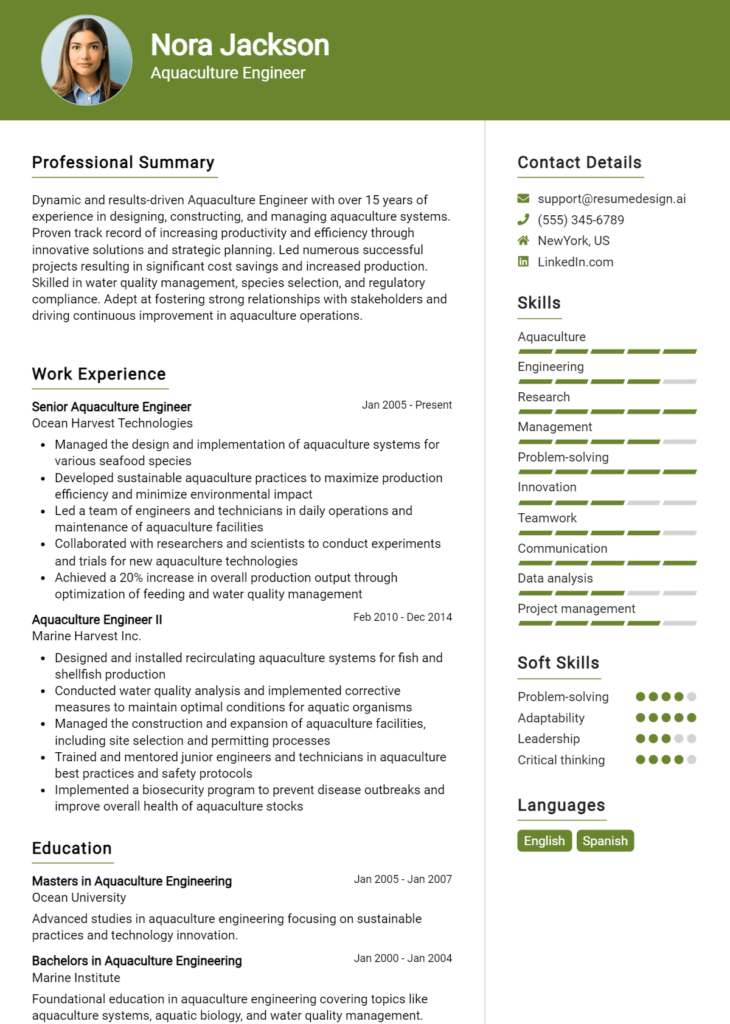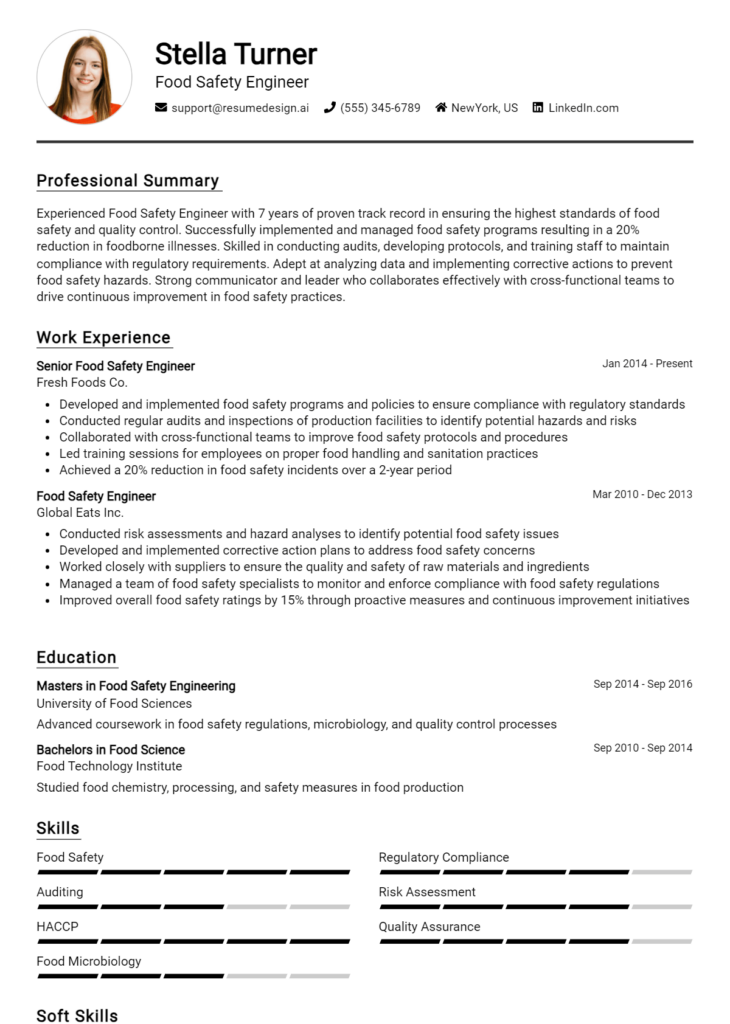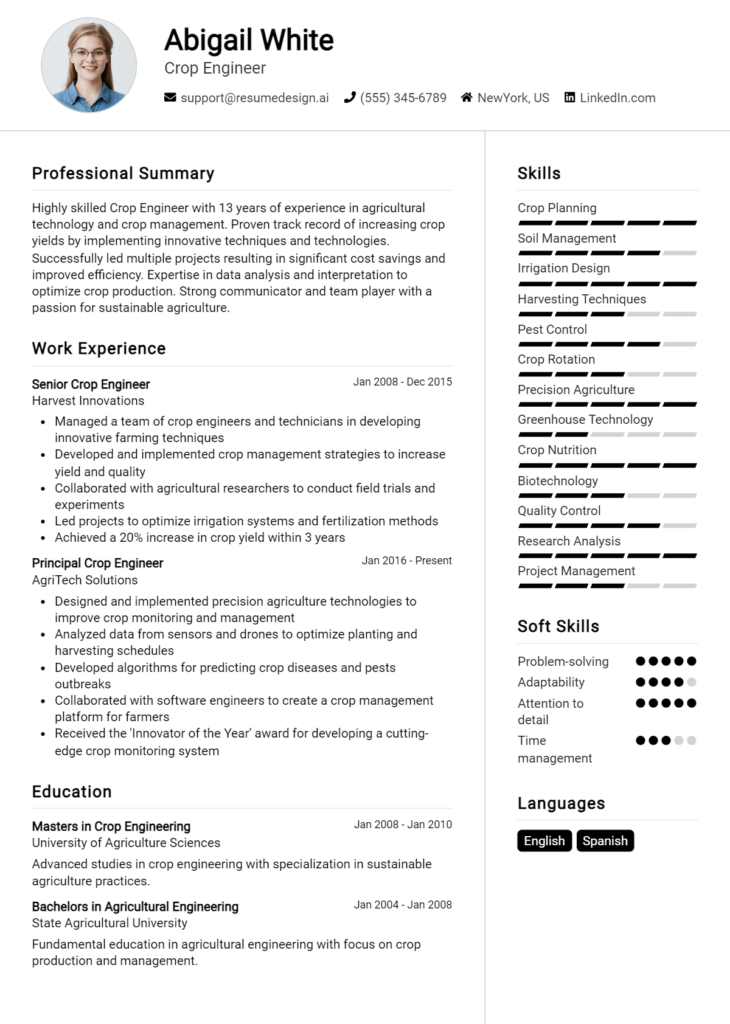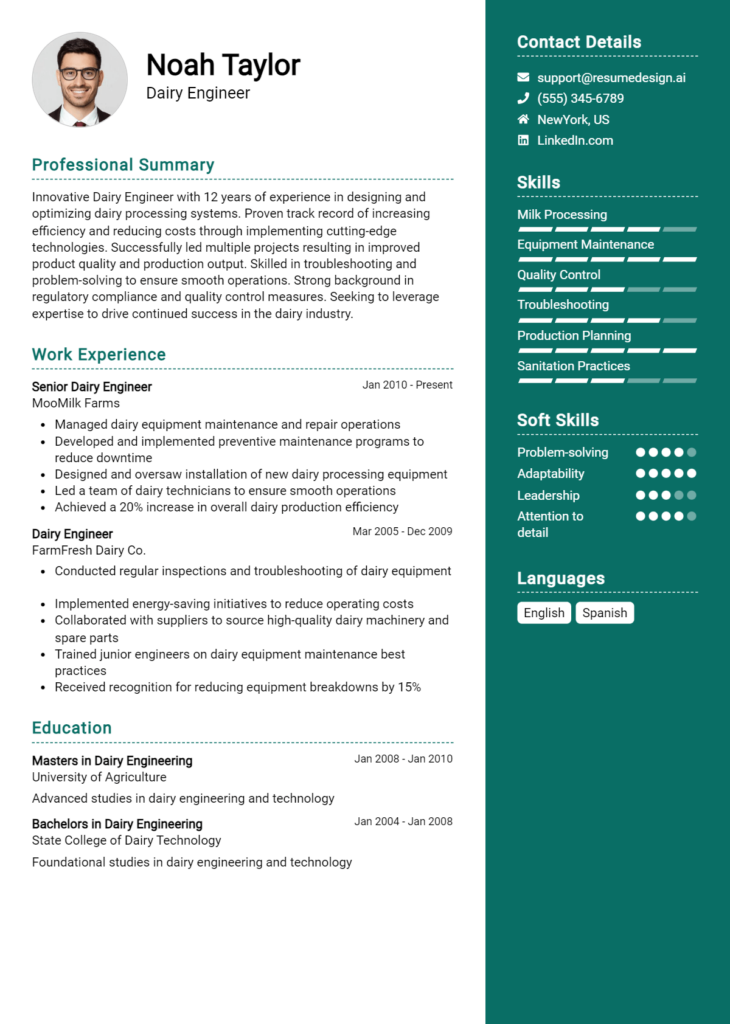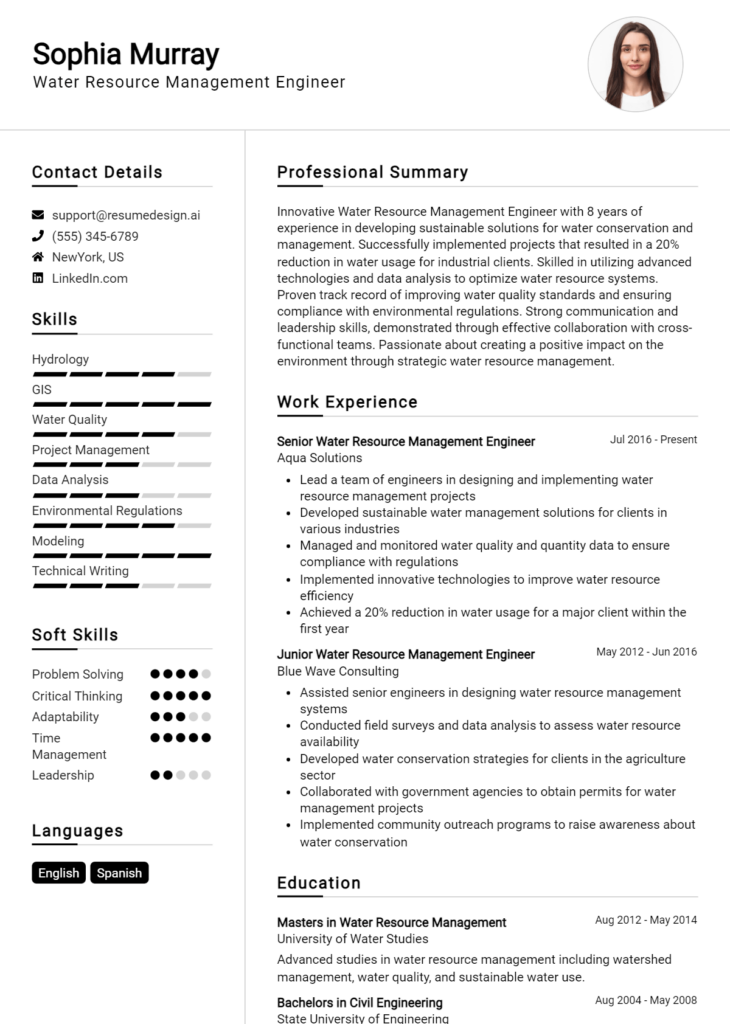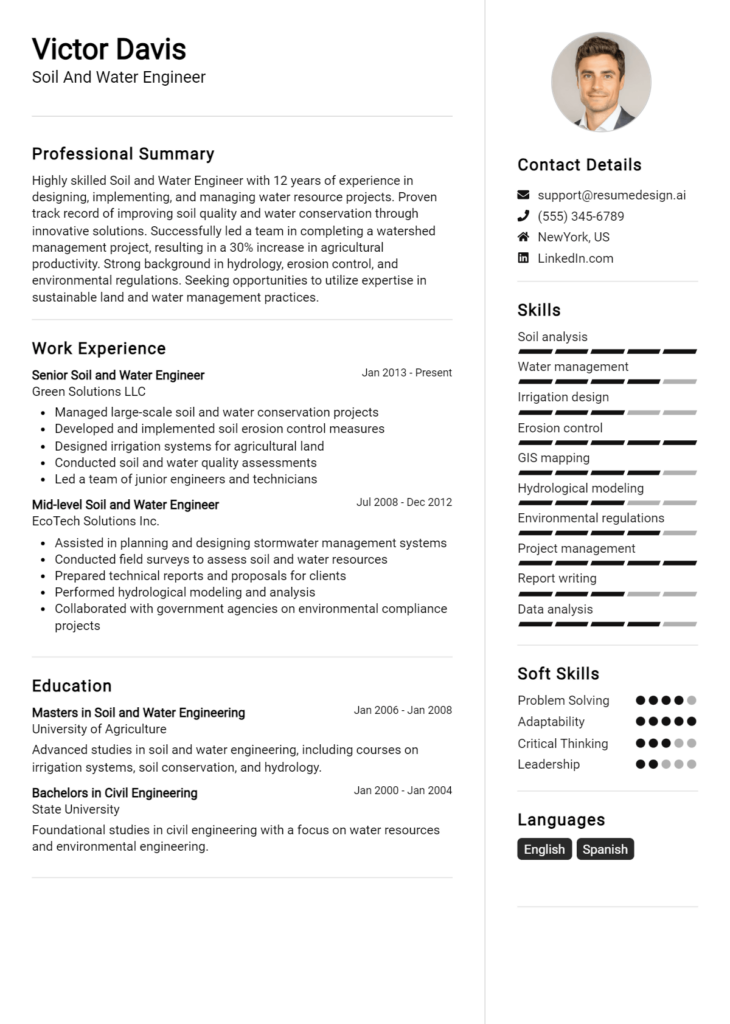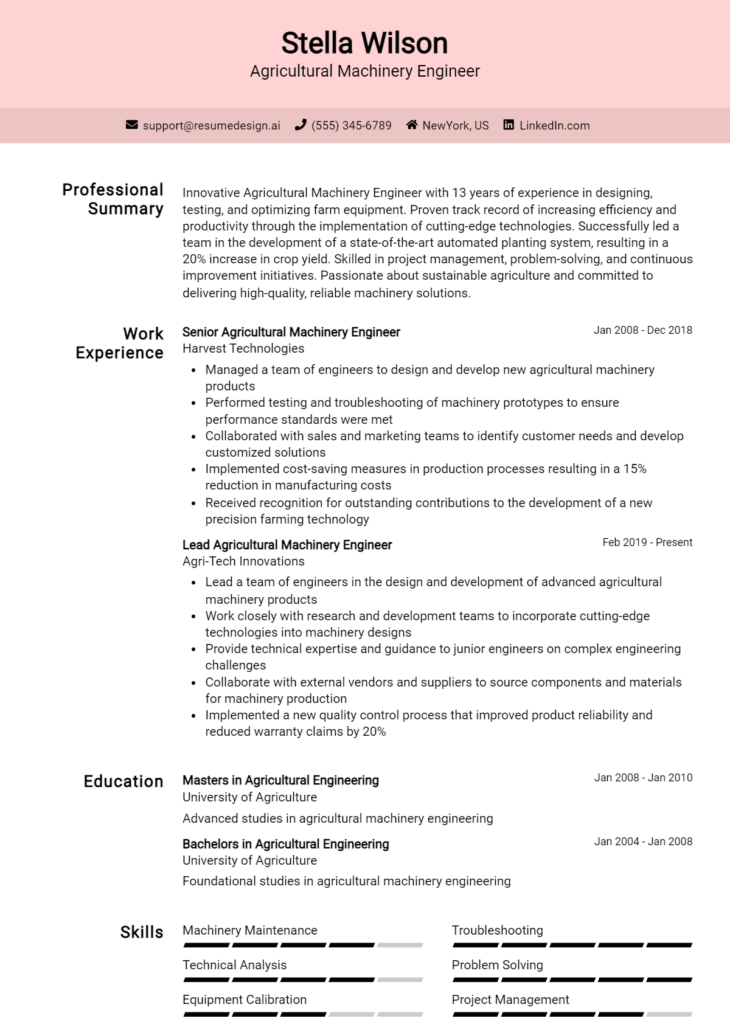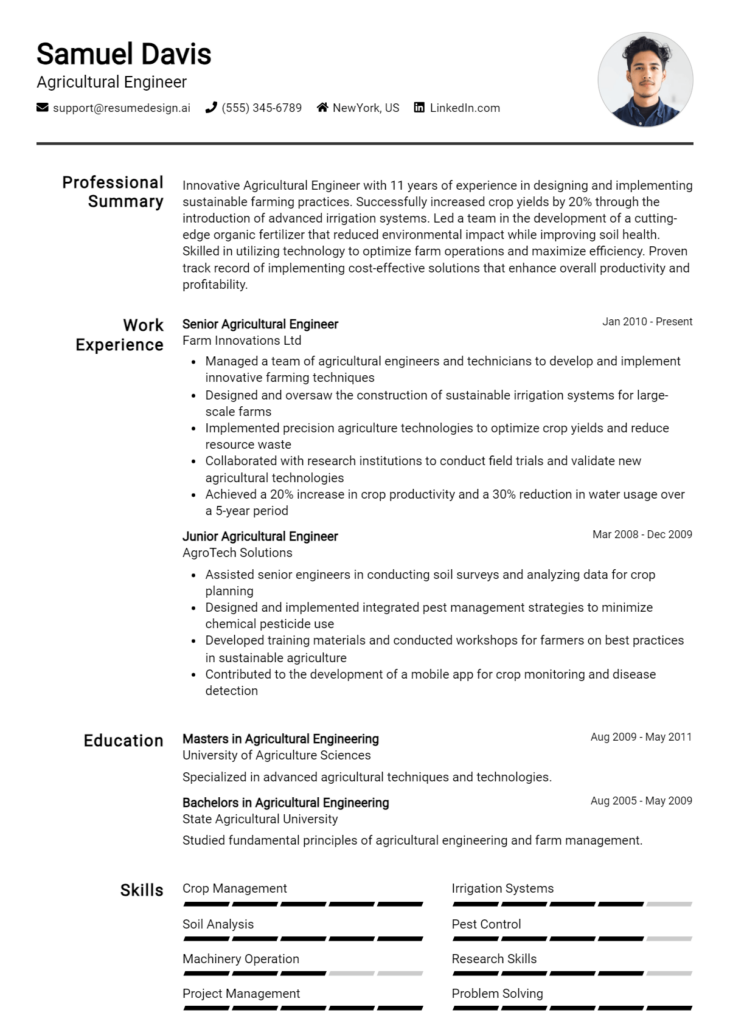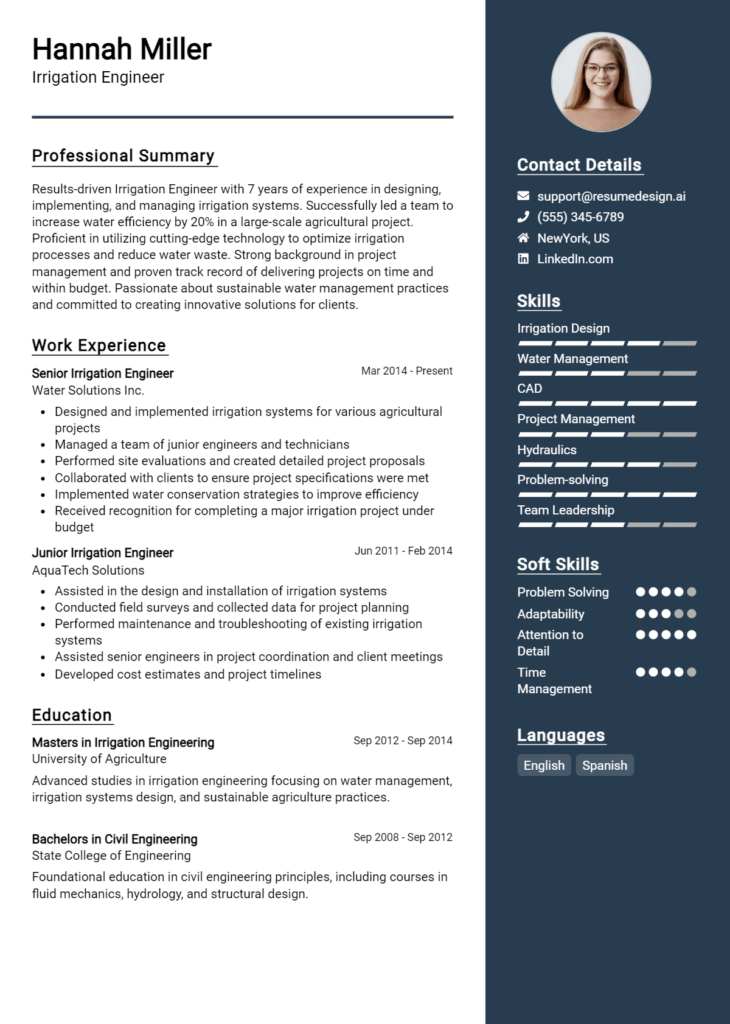Precision Agriculture Engineer Core Responsibilities
A Precision Agriculture Engineer plays a crucial role in enhancing agricultural productivity through the integration of technology and data analysis. Their key responsibilities include designing and implementing precision farming systems, collaborating with agronomists and data scientists, and utilizing sensor technology to optimize crop yields. Essential skills encompass technical expertise in GIS and remote sensing, operational management, and advanced problem-solving abilities. These competencies contribute significantly to the organization’s goals by improving efficiency and sustainability. A well-structured resume can effectively highlight these qualifications, showcasing the candidate's potential value to prospective employers.
Common Responsibilities Listed on Precision Agriculture Engineer Resume
- Design and implement precision agriculture technologies and systems.
- Analyze data from sensors and satellite imagery to inform farming practices.
- Collaborate with agronomists to develop optimal crop management strategies.
- Conduct field trials to evaluate the effectiveness of precision tools.
- Provide technical support for operational teams in implementing precision practices.
- Monitor and assess the environmental impact of farming operations.
- Develop training materials and conduct workshops for farmers on precision techniques.
- Evaluate and recommend new technologies for precision agriculture applications.
- Work with multidisciplinary teams to ensure project alignment with agricultural goals.
- Maintain accurate records of research findings and project progress.
- Stay updated on industry trends and advancements in precision agriculture.
High-Level Resume Tips for Precision Agriculture Engineer Professionals
In today’s competitive job market, a well-crafted resume is essential for Precision Agriculture Engineer professionals seeking to make their mark. Your resume is often the first impression you will make on a potential employer, serving as a critical tool to showcase not only your skills but also your significant achievements in the field. A strong resume can set you apart from other candidates by effectively communicating your expertise in precision technology, sustainable practices, and data-driven decision-making. This guide will provide practical and actionable resume tips specifically tailored for Precision Agriculture Engineer professionals, helping you to present your qualifications in the best possible light.
Top Resume Tips for Precision Agriculture Engineer Professionals
- Tailor your resume to match the job description, using keywords and phrases that align with the specific requirements of the position.
- Highlight relevant experience, including internships, projects, or research that showcase your work in precision agriculture and related technologies.
- Quantify your achievements with specific metrics, such as percentage improvements in crop yield or reductions in resource usage, to demonstrate the impact of your work.
- Emphasize industry-specific skills, such as proficiency in GPS technology, GIS mapping, data analytics, and familiarity with agricultural software tools.
- Showcase certifications and ongoing education related to precision agriculture, including any specialized training or workshops you have completed.
- Include a summary statement at the top of your resume that succinctly captures your career objectives and key qualifications in precision agriculture.
- Utilize a clean and professional format to ensure easy readability, incorporating bullet points and clear headings to organize information effectively.
- Incorporate soft skills such as teamwork, problem-solving, and communication, which are vital for collaboration in multidisciplinary teams.
- Network and gather testimonials or references from industry professionals to add credibility to your resume.
By implementing these tips, Precision Agriculture Engineer professionals can significantly increase their chances of landing a job in this dynamic field. A well-structured and tailored resume not only highlights your qualifications but also demonstrates your commitment to advancing sustainable agricultural practices and technology. Taking the time to refine your resume will position you as a strong candidate ready to contribute to the future of agriculture.
Why Resume Headlines & Titles are Important for Precision Agriculture Engineer
In the competitive field of precision agriculture engineering, a resume headline or title plays a critical role in capturing the attention of hiring managers. A strong headline can serve as a powerful summary of a candidate's key qualifications, effectively encapsulating their expertise and unique selling points in a single, impactful phrase. It should be concise, relevant, and directly aligned with the job being applied for, allowing potential employers to quickly assess a candidate's fit for the position. By crafting an effective resume headline, candidates can differentiate themselves in a crowded job market and set a positive tone for the rest of their application.
Best Practices for Crafting Resume Headlines for Precision Agriculture Engineer
- Keep it concise – Aim for one impactful sentence or phrase.
- Use specific keywords – Incorporate role-specific terms that relate to precision agriculture.
- Highlight key strengths – Focus on relevant skills, experiences, or certifications.
- Align with job description – Tailor your headline to reflect the job you are applying for.
- Showcase achievements – Mention any significant accomplishments or contributions in the field.
- Maintain professionalism – Use a formal tone appropriate for the engineering field.
- Avoid jargon – Keep language clear and understandable, steering clear of overly technical terms.
- Make it impactful – Use strong action verbs and positive language to convey confidence.
Example Resume Headlines for Precision Agriculture Engineer
Strong Resume Headlines
Innovative Precision Agriculture Engineer with 5+ Years of Experience in Advanced Irrigation Technologies
Data-Driven Engineer Specializing in Smart Farming Solutions and Crop Optimization Strategies
Certified Precision Agriculture Specialist with Proven Track Record in Yield Enhancement and Resource Management
Expert in Agronomic Data Analysis and Precision Technology Implementation for Sustainable Farming
Weak Resume Headlines
Engineer Looking for Job in Agriculture
Experienced Professional Seeking New Opportunities
The strong headlines are effective because they are specific, highlighting key strengths and relevant experiences that directly relate to the role of a precision agriculture engineer. They utilize industry-specific language and demonstrate a clear understanding of the job requirements, making them appealing to hiring managers. Conversely, the weak headlines fail to impress due to their vagueness and lack of relevant content; they do not convey any specific skills or accomplishments, leaving hiring managers with little reason to consider the candidate further.
Writing an Exceptional Precision Agriculture Engineer Resume Summary
A well-crafted resume summary is crucial for a Precision Agriculture Engineer, as it serves as the first impression a potential employer has of a candidate. This brief yet powerful statement quickly captures the attention of hiring managers by highlighting relevant skills, experience, and accomplishments that align with the specific job role. An effective summary should be concise, impactful, and tailored to the job description, ensuring that it demonstrates the candidate's value and sets them apart from the competition.
Best Practices for Writing a Precision Agriculture Engineer Resume Summary
- Quantify achievements: Use numbers and percentages to illustrate your accomplishments and impact.
- Focus on relevant skills: Highlight technical skills, software proficiencies, and agricultural expertise that are pertinent to the job.
- Tailor the summary: Customize your summary for each job application to reflect the specific requirements and keywords found in the job description.
- Keep it concise: Aim for 2-4 sentences that clearly communicate your qualifications without being overly verbose.
- Showcase industry knowledge: Mention any relevant certifications, methodologies, or technologies you are familiar with in precision agriculture.
- Highlight problem-solving abilities: Discuss how your skills have been applied to solve real-world challenges in agriculture.
- Use strong action verbs: Start with powerful action words to convey your accomplishments and expertise effectively.
- Maintain a professional tone: Ensure your summary reflects professionalism and aligns with the expectations of the agricultural industry.
Example Precision Agriculture Engineer Resume Summaries
Strong Resume Summaries
Results-driven Precision Agriculture Engineer with over 5 years of experience implementing advanced data analytics and precision farming techniques that increased crop yields by 30%. Proficient in utilizing GIS technology and remote sensing tools to optimize resource allocation and enhance sustainability.
Dynamic Precision Agriculture Engineer skilled in drone technology and soil health assessment, having successfully reduced fertilizer costs by 20% through precision application strategies. Adept at collaborating with farmers to develop customized solutions that maximize productivity.
Detail-oriented Precision Agriculture Engineer with a proven track record of leading interdisciplinary teams to develop innovative agricultural technologies. Spearheaded a project that improved irrigation efficiency by 40%, resulting in significant water conservation.
Weak Resume Summaries
Experienced engineer looking for a position in agriculture where I can use my skills.
A knowledgeable professional in precision agriculture with a desire to help farmers improve their yields.
The strong resume summaries stand out due to their specific achievements, quantifiable results, and relevance to the Precision Agriculture Engineer role. They showcase the candidate's unique skills and experiences, making them attractive to hiring managers. In contrast, the weak summaries lack detail, specificity, and measurable outcomes, failing to create a compelling case for the candidate's qualifications and suitability for the position.
Work Experience Section for Precision Agriculture Engineer Resume
The work experience section is a critical component of a Precision Agriculture Engineer resume, as it effectively showcases the candidate's technical skills, leadership capabilities, and commitment to delivering high-quality agricultural solutions. This section allows potential employers to assess how well candidates can apply their knowledge in real-world settings, manage teams, and contribute to innovative agricultural practices. By quantifying achievements and aligning their experience with industry standards, candidates can demonstrate their value and suitability for the role, making this section pivotal in capturing the attention of hiring managers.
Best Practices for Precision Agriculture Engineer Work Experience
- Highlight specific technical skills related to precision agriculture technologies, such as GIS, remote sensing, and data analysis.
- Quantify results by using metrics that demonstrate the impact of your work, such as percentage increases in yield or reductions in resource costs.
- Emphasize collaboration by detailing experiences where you worked in cross-functional teams or led projects that required input from various stakeholders.
- Use action verbs to convey responsibility and initiative, such as “developed,” “implemented,” and “coordinated.”
- Tailor your experiences to match job descriptions and industry standards to ensure relevance and alignment with the employer’s needs.
- Include any certifications or training that enhance your technical expertise and show continuous professional development.
- Describe challenges faced in previous roles and how you overcame them, showcasing problem-solving abilities.
- Keep the language clear and concise, avoiding jargon that may not be understood by all hiring managers.
Example Work Experiences for Precision Agriculture Engineer
Strong Experiences
- Led a team of five engineers to develop a precision irrigation system that reduced water consumption by 30% while increasing crop yield by 15% over two growing seasons.
- Implemented a GIS-based soil management system that improved soil health assessments, resulting in a 20% reduction in fertilizer use across 1,000 acres.
- Collaborated with agronomists and data scientists to create a predictive analytics model that increased harvest efficiency by 25%, saving the company $100,000 annually.
- Designed and executed a drone survey program that provided real-time data on crop health for over 500 acres, leading to timely interventions and a 10% increase in overall farm productivity.
Weak Experiences
- Worked on various projects related to agriculture without specifying any outcomes or contributions.
- Assisted in team meetings and discussions about agricultural practices without detailing specific roles or responsibilities.
- Involved in the development of agricultural technology with no mention of measurable results or technical skills applied.
- Participated in some data collection for agriculture research projects but did not highlight any impact or learning outcomes.
The examples classified as strong experiences showcase specific, quantifiable outcomes that demonstrate effective technical leadership and collaboration within the field of precision agriculture. These experiences highlight the candidate's ability to deliver tangible results and work successfully in team settings. Conversely, the weak experiences lack detail and measurable impact, making them less compelling to potential employers. They fail to convey the candidate's skills and contributions effectively, ultimately diminishing the strength of the resume.
Education and Certifications Section for Precision Agriculture Engineer Resume
The education and certifications section of a Precision Agriculture Engineer resume is crucial as it showcases the candidate's academic achievements and proficiency in the field. This section not only highlights the relevant degrees attained but also emphasizes industry-recognized certifications and ongoing professional development efforts. By providing details about relevant coursework and specialized training, candidates can significantly enhance their credibility and demonstrate their alignment with the specific requirements of the job role, thereby making a compelling case to potential employers.
Best Practices for Precision Agriculture Engineer Education and Certifications
- Prioritize relevant degrees such as a Bachelor's or Master's in Agricultural Engineering, Environmental Science, or related fields.
- List industry-recognized certifications, such as Certified Crop Adviser (CCA) or Precision Agriculture Technician certification.
- Include significant coursework that directly relates to precision agriculture technologies and methodologies.
- Highlight any specialized training in software or tools commonly used in precision agriculture, including GIS, remote sensing, or data analytics.
- Keep the section organized and clearly formatted for easy readability, using bullet points and subheadings as needed.
- Update the section regularly to include new certifications or courses to reflect continuous learning and adaptation to industry changes.
- Consider including any relevant workshops, seminars, or conferences attended that demonstrate a commitment to professional growth.
- Use quantifiable achievements or projects completed during educational programs to illustrate practical application of knowledge and skills.
Example Education and Certifications for Precision Agriculture Engineer
Strong Examples
- Bachelor of Science in Agricultural Engineering, University of California, Davis, 2021
- Certified Crop Adviser (CCA), American Society of Agronomy, 2022
- Coursework in Precision Agriculture Technologies, including Remote Sensing and GIS Applications, 2020
- Advanced Certificate in Data Analytics for Agriculture, Purdue University, 2023
Weak Examples
- Associate Degree in General Studies, Community College, 2018
- Certification in Basic Computer Skills, Online Course, 2019
- Coursework in History and Philosophy, University of Kentucky, 2020
- High School Diploma, Anytown High School, 2016
The strong examples are considered effective as they directly align with the requirements of a Precision Agriculture Engineer, showcasing relevant educational qualifications and certifications that demonstrate expertise in the field. In contrast, the weak examples lack relevance to precision agriculture, indicating outdated or unrelated qualifications that do not contribute to the candidate's suitability for the role. By clearly distinguishing between these examples, candidates can better understand the importance of selecting education and certifications that enhance their professional profile.
Top Skills & Keywords for Precision Agriculture Engineer Resume
In the rapidly evolving field of precision agriculture, having the right skills is crucial for a Precision Agriculture Engineer to succeed. A well-crafted resume that highlights both hard and soft skills can effectively demonstrate a candidate's qualifications and potential contributions to prospective employers. Precision agriculture relies on advanced technologies and methodologies to optimize farming practices, making it essential for professionals in this field to possess a diverse skill set. By focusing on relevant skills, candidates can showcase their expertise in utilizing innovative solutions to enhance crop yields, improve sustainability, and reduce waste. This not only boosts their employability but also aligns their capabilities with the industry's demands.
Top Hard & Soft Skills for Precision Agriculture Engineer
Soft Skills
- Analytical thinking
- Problem-solving
- Communication skills
- Team collaboration
- Adaptability
- Attention to detail
- Project management
- Time management
- Leadership abilities
- Creativity
Hard Skills
- Geographic Information Systems (GIS)
- Remote sensing technology
- Data analysis and interpretation
- Precision farming techniques
- Soil science
- Agricultural machinery operation
- Programming languages (e.g., Python, R)
- Drone technology
- Statistical modeling
- Environmental science knowledge
For more insights into essential skills and to effectively present your work experience, it's important to stay updated with the latest advancements in precision agriculture. Highlighting relevant skills on your resume will help you stand out in this competitive field.
Stand Out with a Winning Precision Agriculture Engineer Cover Letter
Dear [Hiring Manager's Name],
I am writing to express my enthusiasm for the Precision Agriculture Engineer position at [Company Name], as advertised on [Where You Found the Job Posting]. With a solid background in agricultural engineering and a passion for leveraging technology to improve farming efficiency, I am excited about the opportunity to contribute to your team. My education in agricultural systems and experience with precision farming technologies uniquely position me to excel in this role.
During my previous role at [Previous Company Name], I successfully implemented precision agriculture solutions that increased crop yields by 20% while reducing resource waste by 15%. I utilized advanced data analytics, GPS technology, and remote sensing to develop customized farming strategies tailored to individual fields. My hands-on experience with various agricultural software platforms and tools, combined with my strong problem-solving skills, allowed me to identify inefficiencies and recommend actionable solutions that benefited both the farmers and the environment.
I am particularly impressed by [Company Name]'s commitment to sustainable agriculture practices and innovation in precision farming. I believe that my proactive approach to integrating technology with traditional farming methods aligns perfectly with your vision. I am eager to bring my expertise in data analysis, project management, and team collaboration to your organization, ensuring that we continue to push the boundaries of what precision agriculture can achieve.
Thank you for considering my application. I look forward to the opportunity to discuss how my skills and experiences can benefit [Company Name] and contribute to the advancement of sustainable agricultural practices. Please feel free to contact me at [Your Phone Number] or [Your Email Address] to arrange a convenient time for an interview.
Sincerely,
[Your Name]
Common Mistakes to Avoid in a Precision Agriculture Engineer Resume
Crafting a resume for a Precision Agriculture Engineer position can be challenging, and many candidates inadvertently make mistakes that can hinder their chances of landing an interview. Understanding these common pitfalls can help you create a more effective resume that showcases your skills and experiences in the best light. Here are some frequent mistakes to avoid:
Generic Objective Statements: Using a vague objective that does not specifically relate to precision agriculture can make your resume less compelling. Tailor your objective to reflect your career goals and how they align with the position.
Neglecting Relevant Skills: Failing to highlight specific technical skills related to precision agriculture, such as GIS technology, data analysis, or remote sensing, can make your application less competitive. Ensure your skills match the job requirements.
Overloading with Jargon: While technical language can demonstrate your expertise, overusing jargon can alienate non-technical hiring managers. Aim for clarity and balance technical terms with accessible language.
Inconsistent Formatting: A resume that lacks a consistent format can be difficult to read and appear unprofessional. Use uniform fonts, sizes, and bullet points to enhance readability and organization.
Ignoring Achievements: Listing job responsibilities without emphasizing achievements can downplay your impact in previous roles. Quantify your accomplishments to show how you contributed to your past employers.
Too Much Focus on Education: While education is important, overly emphasizing academic qualifications at the expense of practical experience can be misleading. Highlight relevant work experience and projects, especially those that showcase your application of precision agriculture concepts.
Omitting Keywords: Many companies use Applicant Tracking Systems (ATS) to filter resumes. Not including relevant keywords from the job description can result in your resume being overlooked. Carefully analyze the job posting for essential terms and incorporate them into your resume.
Lengthy Descriptions: Providing overly lengthy job descriptions can overwhelm the reader and obscure key information. Keep descriptions concise and focused on the most impactful details of your experience.
Conclusion
As we’ve explored the essential responsibilities and skills required for a Precision Agriculture Engineer, it’s clear that this role is pivotal in advancing sustainable farming practices through technology and innovation. Precision Agriculture Engineers leverage cutting-edge technologies such as GPS, IoT, and data analytics to enhance crop yield, reduce waste, and optimize resource use. They are tasked with designing and implementing precision farming systems that not only improve efficiency but also contribute to the environmental sustainability of agricultural practices.
To excel in this dynamic field, professionals need to highlight their technical skills, analytical abilities, and understanding of agricultural science on their resumes. Ensuring that your resume reflects these competencies is crucial for standing out to potential employers.
Now is the time to take action! Review your Precision Agriculture Engineer resume to ensure it showcases your qualifications effectively. Utilize available resources to enhance your application materials. Check out resume templates to find a format that suits your style, use the resume builder for a streamlined creation process, and browse through resume examples for inspiration. Don’t forget the importance of a strong introduction; consider using cover letter templates to craft a compelling cover letter that complements your resume. Take the next step in your career today!

